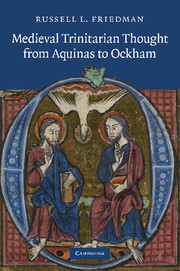Book contents
- Frontmatter
- Contents
- Acknowledgments
- List of symbols, abbreviations, and conventions
- Introduction
- 1 The Trinity and the Aristotelian categories: different ways of explaining identity and distinction
- 2 The Trinity and human psychology: “In the beginning was the Word”
- 3 The Trinity and metaphysics: the formal distinction, divine simplicity, and the psychological model
- 4 The Trinity, divine simplicity, and fideism – or: was Gilson right about the fourteenth century after all?
- Appendix: Major elements in Franciscan and Dominican trinitarian theologies
- Bibliography of primary sources
- Annotated bibliography of selected secondary literature
- Index
- References
1 - The Trinity and the Aristotelian categories: different ways of explaining identity and distinction
Published online by Cambridge University Press: 26 February 2010
- Frontmatter
- Contents
- Acknowledgments
- List of symbols, abbreviations, and conventions
- Introduction
- 1 The Trinity and the Aristotelian categories: different ways of explaining identity and distinction
- 2 The Trinity and human psychology: “In the beginning was the Word”
- 3 The Trinity and metaphysics: the formal distinction, divine simplicity, and the psychological model
- 4 The Trinity, divine simplicity, and fideism – or: was Gilson right about the fourteenth century after all?
- Appendix: Major elements in Franciscan and Dominican trinitarian theologies
- Bibliography of primary sources
- Annotated bibliography of selected secondary literature
- Index
- References
Summary
The task in trinitarian theology is to explain how three really distinct persons, the Father, the Son, and the Holy Spirit, can be essentially identical. In the present chapter, I describe the later thirteenth-century origins of two different, and indeed rival or competing, ways of explaining that most basic trinitarian fact. In particular, I discuss a theory that appeals to the Aristotelian category of relation to explain personal distinction and essential identity. From Thomas Aquinas (†1274) and on, most Dominican theologians held a version of this theory, which I call the “relation account” of personal distinction. I also discuss a rival theory that, in order to explain identity and distinction, appeals to emanation, that is to say the way that the divine persons are put into being or originated. This “emanation account” of personal distinction is closely related to the Aristotelian categories of action and passion, and, as we will see, following a tendency in Bonaventure's (†1274) thought, most Franciscan theologians adhered to this view. Significantly, the confrontation between the respective adherents of each of these two major views drives many of the most important developments in late thirteenth- and early fourteenth-century trinitarian thought. For this reason, this chapter really sets the stage for the rest of the book.
The chapter is structured as follows. First I give some background information on the two trinitarian views, the primarily Dominican relation account and the primarily Franciscan emanation account; in this first section I also provide the most important trinitarian terminology.
- Type
- Chapter
- Information
- Medieval Trinitarian Thought from Aquinas to Ockham , pp. 5 - 49Publisher: Cambridge University PressPrint publication year: 2010



